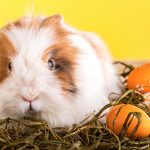1. Understanding a Rabbit’s Nutritional Needs
Rabbits have unique dietary requirements that are essential for their health and longevity. Their digestive systems are designed to process high-fiber foods, which help maintain gut health and prevent serious medical issues. A well-balanced diet provides the necessary nutrients to support their energy levels, immune system, and overall well-being.
The Importance of Fiber
Fiber is the most critical component of a rabbits diet. It aids digestion, prevents gastrointestinal stasis, and keeps their teeth in good condition. Hay should make up the majority of their daily intake.
Recommended Fiber Sources
| Food Source | Benefits |
|---|---|
| Timothy Hay | High in fiber, promotes digestion, and supports dental health |
| Orchard Grass | Soft texture, good alternative for picky eaters |
| Meadow Hay | Varied texture and taste, encourages natural foraging behavior |
| Bermuda Grass | Good fiber content, suitable for sensitive stomachs |
Essential Vitamins and Minerals
Rabbits require a variety of vitamins and minerals to maintain their health. Most of these nutrients come from fresh vegetables and high-quality pellets.
Key Vitamins and Their Benefits
- Vitamin A: Supports vision, skin health, and immune function (found in leafy greens like kale and romaine lettuce).
- Vitamin D: Helps with calcium absorption for strong bones (obtained through limited sun exposure).
- Vitamin E: Acts as an antioxidant and promotes muscle function (found in leafy greens and some pellets).
- Calcium: Necessary for bone health but should be given in moderation to prevent bladder stones (found in small amounts in certain greens).
The Role of Hydration
Water is just as important as food when it comes to rabbit care. Dehydration can lead to serious health issues such as kidney problems and digestive blockages.
Best Ways to Provide Water
- Fresh water daily: Always provide clean, fresh water in a bowl or bottle.
- Bowl vs. bottle: Bowls allow for more natural drinking behavior, while bottles can help keep water clean.
- Hydrating vegetables: Leafy greens like romaine lettuce can supplement hydration but should not replace fresh water.
The Importance of a Balanced Diet
A balanced diet ensures that rabbits receive all the essential nutrients they need to thrive. Without proper nutrition, they may suffer from digestive issues, obesity, or dental problems. By providing a diet rich in hay, fresh vegetables, high-quality pellets, and plenty of water, you can help your rabbit live a long and healthy life.
2. The Importance of Hay in a Rabbit’s Diet
When it comes to feeding your rabbit, hay should be the most important part of their diet. It provides essential nutrients, supports digestion, and helps maintain dental health. Let’s explore why hay is so crucial and which types are best for your furry friend.
Why Hay Should Be the Primary Component
Rabbits have a unique digestive system that requires a high-fiber diet to function properly. Hay provides the necessary fiber to keep their gut moving and prevent issues like GI stasis, a dangerous condition where digestion slows or stops. Additionally, chewing hay naturally wears down their teeth, preventing overgrowth and dental problems.
Best Types of Hay for Rabbits
Not all hay is the same, and choosing the right type can make a big difference in your rabbit’s health. Here are some of the best options:
| Type of Hay | Benefits | Best For |
|---|---|---|
| Timothy Hay | High in fiber, supports digestion, good for dental health | Adult rabbits |
| Orchard Grass Hay | Softer texture, sweet aroma, good alternative for allergies | All rabbits |
| Meadow Hay | Diverse texture and taste, encourages natural foraging behavior | All rabbits |
| Alfalfa Hay | Higher in protein and calcium, good for growth | Baby rabbits (under 6 months) or nursing mothers |
How Hay Supports Digestive and Dental Health
Digestive Health
The high fiber content in hay keeps a rabbit’s digestive system running smoothly. A consistent intake of hay helps prevent digestive blockages and ensures regular bowel movements. Without enough fiber, rabbits can suffer from severe gastrointestinal issues.
Dental Health
A rabbit’s teeth grow continuously throughout their life. Chewing on hay naturally grinds down their teeth, preventing painful dental issues like overgrown molars or sharp spurs that can cause mouth sores.
How Much Hay Should Rabbits Eat?
Your rabbit should have unlimited access to fresh hay at all times. A good rule of thumb is that at least 80% of their daily diet should consist of hay. This ensures they get enough fiber to stay healthy.
Keeping Hay Fresh and Appealing
To encourage your rabbit to eat more hay, make sure it stays fresh and appealing:
- Store Properly: Keep hay in a dry, well-ventilated area to prevent mold.
- Offer Variety: Mixing different types of hay can keep your rabbit interested.
- Use a Hay Rack: Keeping hay off the floor prevents contamination and waste.
- Add Treats: Hiding small amounts of dried herbs or treats in the hay can encourage more consumption.
By making hay the foundation of your rabbit’s diet, you’re ensuring they stay healthy, happy, and active for years to come.
![]()
3. Fresh Vegetables and Leafy Greens
Fresh vegetables and leafy greens are essential components of a rabbit’s diet, providing vital nutrients, hydration, and variety. However, its important to choose the right types of veggies and feed them in appropriate portions to prevent digestive issues.
Best Vegetables and Leafy Greens for Rabbits
Rabbits thrive on a variety of fresh vegetables, particularly leafy greens. These foods offer fiber, vitamins, and minerals that contribute to overall health. Below is a list of safe and beneficial vegetables for rabbits:
| Vegetable | Benefits |
|---|---|
| Romaine Lettuce | High in fiber and hydration; avoid iceberg lettuce as it has little nutritional value. |
| Kale | Rich in vitamins A, C, and K; should be given in moderation due to higher calcium content. |
| Cilantro | Aromatic herb that supports digestion and provides essential nutrients. |
| Basil | Packed with antioxidants and adds variety to their diet. |
| Dandelion Greens | Nutrient-dense and great for digestion; can be fed regularly. |
| Bok Choy | A good source of vitamins A and C with a crunchy texture rabbits enjoy. |
| Zucchini | Mild and easy to digest; provides hydration. |
The Right Portions for a Healthy Rabbit Diet
A balanced rabbit diet should consist mainly of hay (about 80%), with fresh vegetables making up around 10-15% of their daily intake. Here’s how to serve veggies appropriately:
- Diverse selection: Offer a mix of 3-4 different types of leafy greens daily for variety.
- Proper portion size: A general rule is about 1 cup of leafy greens per 2 pounds of body weight per day.
- Introduce new foods gradually: Adding too many new vegetables at once can cause stomach upset. Introduce one type at a time over several days.
- Avoid excess high-calcium greens: While nutritious, too much kale or spinach can contribute to kidney issues.
Avoid These Vegetables to Prevent Digestive Issues
Certain vegetables can cause bloating, gas, or other digestive problems in rabbits. Avoid feeding your rabbit the following:
| Avoid These Vegetables | Reason to Avoid |
|---|---|
| Icberg Lettuce | Lacks nutrients and contains lactucarium, which may cause diarrhea. |
| Cabbage & Brussels Sprouts | Tends to cause gas and bloating. |
| Potatoes & Sweet Potatoes | Too starchy and difficult for rabbits to digest. |
| Onions & Garlic | Toxic to rabbits; can lead to serious health issues. |
| Mushrooms | Poorly digested and potentially toxic. |
| Corn & Beans | Difficult to digest; may cause intestinal blockages. |
How to Prepare Vegetables for Your Rabbit
The way you prepare vegetables matters just as much as choosing the right ones. Follow these simple steps:
- Wash thoroughly: Always rinse vegetables under running water to remove pesticides or dirt.
- No seasoning or cooking: Serve all vegetables raw—rabbits don’t need seasoning or cooking.
- Sliced or chopped if necessary: Larger veggies like carrots or zucchini can be cut into smaller pieces for easier eating.
- No wilted produce: Discard any spoiled or wilted vegetables before feeding.
- Mainly leafy greens: Focus on fresh greens rather than starchy veggies like carrots (which should only be occasional treats).
A well-balanced diet that includes plenty of fresh hay, along with carefully selected vegetables in the right amounts, will help keep your rabbit healthy and happy!
4. Pellets: Necessary or Optional?
Pellets are a common part of many pet rabbits diets, but are they truly necessary? Understanding their role in a rabbit’s nutrition can help you make informed decisions about your bunny’s diet.
The Role of Pellets in a Rabbit’s Diet
Pellets were originally designed to provide concentrated nutrition for rabbits in commercial breeding and farming. For pet rabbits, they can be a convenient way to supplement essential vitamins and minerals. However, they should never replace fresh hay and vegetables as the primary food sources.
Choosing High-Quality Pellets
Not all pellets are created equal. Some contain unhealthy fillers that offer little nutritional value. Here’s what to look for when selecting pellets:
| Feature | Ideal Choice | Avoid |
|---|---|---|
| Main Ingredient | Timothy hay-based pellets | Alfalfa-based (for adult rabbits) |
| Additives | No added sugars or artificial colors | Pellets with seeds, nuts, or dried fruit |
| Fiber Content | At least 18% fiber | Low-fiber options (under 15%) |
| Protein Content | 12-14% for adults | Higher than 16% (except for young bunnies) |
| Calcium Levels | 0.5-1% for adults | High-calcium content (can cause kidney issues) |
Are Pellets Essential for a Healthy Rabbit?
The necessity of pellets depends on your rabbit’s overall diet and health needs:
- If your rabbit eats a well-balanced diet of hay, leafy greens, and fresh vegetables, pellets may not be essential.
- If your rabbit is young, elderly, or underweight, pellets can provide extra nutrients to support growth and health.
- If you feed pellets, keep portions small—typically no more than 1/8 to 1/4 cup per day for an average-sized adult rabbit.
Final Thoughts on Pellets in Your Rabbit’s Diet
While high-quality pellets can be beneficial, they should only complement a diet rich in hay and fresh greens. Always monitor your rabbits weight and health, adjusting their pellet intake as needed. By prioritizing natural fiber sources and using pellets wisely, you can ensure your bunny stays happy and healthy.
5. Treats and Foods to Avoid
Rabbits love treats, but not all foods are safe for them. Giving the right treats in moderation can be a great way to bond with your bunny while ensuring their health remains a top priority.
Safe Treats for Rabbits
When offering treats, its best to choose natural, rabbit-friendly options that wont upset their digestive system. Here are some safe choices:
| Safe Treats | Benefits |
|---|---|
| Small pieces of fresh fruit (apple, banana, berries) | Rich in vitamins, but should be given in moderation due to natural sugars. |
| Herbs (parsley, cilantro, basil, mint) | Aromatic and nutritious, providing essential vitamins and minerals. |
| Dried flowers (rose petals, hibiscus, chamomile) | A fun and healthy way to add variety to their diet. |
| Pumpkin or squash (small amounts) | Easily digestible and packed with fiber. |
The Dangers of Sugary and Processed Foods
Sugary and processed foods can be harmful to rabbits, leading to obesity, digestive issues, and even serious health complications. Avoid feeding your rabbit the following:
- Bread, crackers, or pasta: These starchy foods can cause bloating and disrupt gut bacteria.
- Cereal or granola bars: High sugar content can lead to dental problems and obesity.
- Dried fruit with added sugar: While fresh fruit is okay in small amounts, processed dried fruits often contain too much sugar.
- Dairy products: Rabbits cannot digest dairy properly, which can lead to stomach upset.
- Nuts and seeds: High in fat and difficult for rabbits to digest safely.
Toxic Foods That Should Never Be Fed to Rabbits
Certain foods are not just unhealthy but downright dangerous for rabbits. Some can cause severe digestive distress, while others are toxic and potentially fatal. Always avoid these foods:
| Toxic Food | Potential Harm |
|---|---|
| Chocolate | Toxic to rabbits; can cause heart problems and death. |
| Avocado | Poisons rabbits by affecting the heart and lungs. |
| Onions & Garlic | Cause severe blood disorders leading to anemia. |
| Potatoes & Potato Leaves | Difficult to digest and may contain harmful toxins. |
| Mushrooms | Certain varieties are highly toxic to rabbits. |
| Caffeine-containing drinks (coffee, tea, soda) | Affects the nervous system and heart rate dangerously. |
| Ivy or houseplants (philodendron, lilies) | Toxic if ingested; can cause severe illness or death. |
The Importance of Moderation in Treats
Treats should only make up about 5% or less of your rabbit’s daily diet. Overfeeding even healthy treats can lead to digestive imbalances. Stick mainly to hay-based diets with occasional treats for variety and enrichment.
Avoid Feeding by Hand Too Often!
If you hand-feed too many treats regularly, your rabbit may start refusing its regular food. Always prioritize their main diet of hay, fresh vegetables, and high-quality pellets before offering any extras.
Your rabbit’s health starts with a proper diet! By choosing safe treats wisely and avoiding harmful foods, you’ll help ensure they stay happy and healthy for years to come.
6. Hydration and Feeding Best Practices
Ensuring your rabbit stays properly hydrated and follows a well-balanced feeding routine is crucial for its long-term health. Water and food play vital roles in maintaining digestion, preventing illness, and promoting overall well-being.
The Importance of Fresh Water
Fresh water is essential for rabbits to support digestion, regulate body temperature, and prevent dehydration. Rabbits should always have access to clean, fresh water throughout the day. A lack of proper hydration can lead to serious health issues such as urinary tract infections and digestive problems.
Water Bottles vs. Bowls: Which Is Better?
There are two primary ways to provide water for your rabbit: water bottles and bowls. Each has its own benefits and drawbacks.
| Method | Pros | Cons |
|---|---|---|
| Water Bottles | – Keeps water cleaner – Reduces spillage – Good for cage setups |
– Can be difficult for some rabbits to drink from – Requires regular cleaning to prevent clogging |
| Water Bowls | – Easier for rabbits to drink from – More natural drinking position |
– Can easily become contaminated with food or bedding – May tip over, causing messes |
A good approach is to provide both a water bottle and a bowl so your rabbit can choose its preferred drinking method.
Best Feeding Practices for Optimal Health
The Right Balance of Food
A rabbit’s diet should consist of high-quality hay, fresh vegetables, and a limited amount of pellets. Here’s a general guideline:
| Food Type | Recommended Amount | Description |
|---|---|---|
| Hay (Timothy, Orchard, etc.) | Main diet (80-90%) – Unlimited supply | The most important part of a rabbit’s diet, essential for digestion and dental health. |
| Pellets (High-fiber, no added seeds) | Around 1/4 cup per 5 lbs of body weight daily | Nutritionally dense but should be given in moderation. |
| Fresh Vegetables (Leafy greens like romaine, cilantro) | Around 1 cup per 2 lbs of body weight daily | Adds variety and essential nutrients to their diet. |
| Treats (Fruits or commercial treats) | Sparingly – No more than 1-2 tablespoons per day | Naturally sweet foods should only be occasional treats. |
A Consistent Feeding Schedule
Your rabbit will thrive on a consistent feeding schedule. Its best to feed them hay freely throughout the day while offering pellets and fresh vegetables at set times. This helps maintain digestive health and prevents overeating.
Avoiding Harmful Foods
Certain foods can be harmful to rabbits and should always be avoided. Some common examples include:
- Dairy products (rabbits cannot digest lactose)
- Bread, pasta, or processed human food
- Certain vegetables like onions, garlic, potatoes, or iceberg lettuce (can cause digestive issues)
- Nuts and seeds (high in fat and difficult to digest)
- Sugary snacks like chocolate or candy (toxic to rabbits)
A proper diet combined with adequate hydration is key to ensuring your rabbit lives a long and healthy life. By following these best practices, you’ll help your furry friend thrive!


